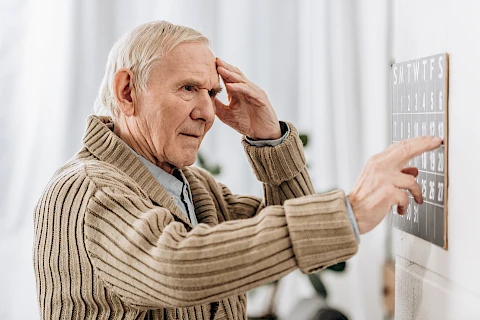
Memory loss is a common concern for seniors. As we age, it's natural to forget things from time to time. However, when memory issues begin to affect day-to-day life, it may be time to consider whether it’s due to something more serious.
Normal Age-Related Memory Loss
Our brains change with age, just like the rest of our bodies. It's common to experience some degree of forgetfulness. Occasionally forgetting names or appointments but remembering them later, misplacing items such as keys or glasses now and then, slower recall of information, or taking longer to learn new things are all considered normal age-related memory lapses. These instances might be frustrating. However, they don’t typically interfere with daily life or activities and are usually not a cause for concern.
Signs of Serious Memory Problems
Frequent forgetfulness that affects daily life could indicate a more significant issue. Forgetting important dates or events is one such sign. Confusion about time, places, or people, such as getting lost in familiar places, is another. Difficulty performing familiar tasks, like paying bills or following a recipe, can also be concerning. Problems understanding visual images and spatial relationships and trouble with speaking or writing can be concerning. Some seniors may also repeat the same stories or struggle following conversations. These signs often suggest conditions like mild cognitive impairment (MCI) or dementia, which require medical attention.
When to Seek Professional Help
Consult a healthcare professional if you're noticing signs of notable memory problems. Consider seeking help if memory loss is affecting your ability to perform day-to-day activities. Do the same thing if you or those around you notice changes in your behavior or personality. Frequent confusion or disorientation can also indicate something more serious. Early diagnosis and intervention can make a difference in maintaining your quality of life.
What to Expect During a Memory Assessment
A memory assessment aims to understand the root cause of memory issues. Your doctor will discuss your medical history and symptoms during the initial consultation. You'll then complete cognitive testing, which involves tasks that assess memory, problem-solving, and other mental functions. You may also undergo a physical exam, including blood tests and brain imaging, to rule out other conditions. Through these assessments, healthcare providers can diagnose the problem accurately and recommend appropriate treatments or interventions.
Tips for Maintaining Cognitive Health
Taking proactive steps can maintain and even improve your cognitive health in the later years. Here are some tips:
- Healthy Diet: Eat a balanced diet rich in fruits, vegetables, and whole grains.
- Regular Exercise: Physical activity increases blood flow to the brain. Always consult a doctor before starting a new exercise routine.
- Mental Stimulation: Engage in activities like puzzles, reading, or learning new skills.
- Social Interaction: Stay connected with family and friends to boost mental well-being.
Implementing these habits can keep your brain healthy and sharp. Consistency matters, so incorporate these habits into your daily routine to reap the benefits of long-term cognitive health.
Experience Exceptional In-Home Care at Senior Helpers
While occasional forgetfulness is normal with age, recognizing when memory loss is a sign of a more serious concern ensures you can seek help for early treatment and intervention. Need help getting to and from your doctor appointments? Senior Helpers Lexington offers professional senior care solutions, including assistance with transportation and appointments, diet monitoring, help with hobbies, and more. Contact us for tailored senior home care in Lexington, Georgetown, Nicholasville, and Shelbyville, KY.